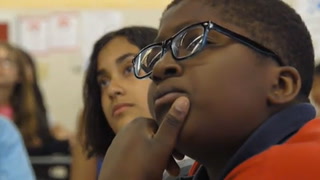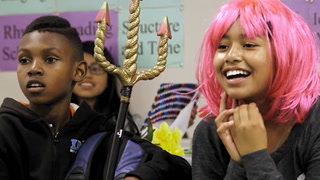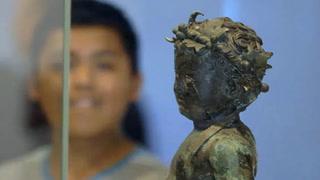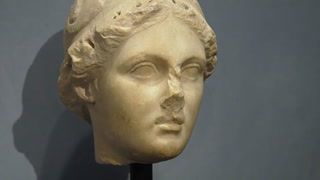Series Arts Integration with David Cooper: Greek Mythology in the Classroom & Museum: Performance as a Culminating Activity
ELA.W.6.3a
| Common core State Standards
- ELA: English Language Arts
- W: Writing Standards 6â\x80\x9312
- 6: 6th Grade
-
3a:
Write narratives to develop real or imagined
experiences or events using effective technique,
relevant descriptive details, and well-structured
event sequences.
a. Engage and orient the reader by establishing
a context and introducing a narrator and/or
characters; organize an event sequence that
unfolds naturally and logically.
b. Use narrative techniques, such as dialogue,
pacing, and description, to develop
experiences, events, and/or characters.
c. Use a variety of transition words, phrases, and
clauses to convey sequence and signal shifts
from one time frame or setting to another.
d. Use precise words and phrases, relevant
descriptive details, and sensory language to
convey experiences and events.
e. Provide a conclusion that follows from the
narrated experiences or events.
ELA.SL.6.6
Common core State Standards
- ELA: English Language Arts
- SL: Speaking and Listening Standards 6-12
- 6: 6th Grade
-
6:
Adapt speech to a variety of contexts and tasks,
demonstrating command of formal English when
indicated or appropriate. (See grade 6 Language
standards 1 and 3 on page 52 for specific
expectations.)
Save to My Resources
PLEASE CREATE A NEW ACCOUNT OR LOG IN TO ACCESS THIS CONTENT
Enjoy your first video for free. Subscribe for unlimited access.
Have questions about subscribing?
Click Here to learn more about individual subscriptions.
Click Here to learn more about School and Institution access.
Discussion and Supporting Materials
Thought starters
- What did students learn through the Greek and Roman mythology unit?
- How was this learning expressed in this performance?
- What does Mr. Cooper look for in his students' performances?
School Details
Prairie Vista Middle School13600 South Prairie Avenue
Hawthorne CA 90250
Population: 833
Data Provided By:

Teachers
David Cooper
Newest
|
4 MIN
|
5 MIN
|
5 MIN
UNCUT CLASSROOMS
| TCHERS' VOICE
English Language Arts















26 Comments
Ashley Waddy Apr 18, 2020 12:35am
I love how the teacher integrated role play into this lesson. It makes such a difference in the learning experience when the the student has the ability to use their imagination.
Sheryl Shah Jul 23, 2018 1:48am
Lorena Suarez V... Sep 6, 2017 12:14pm
Juan Santos May 5, 2017 4:48am
Jovana Mendoza May 5, 2017 12:40am